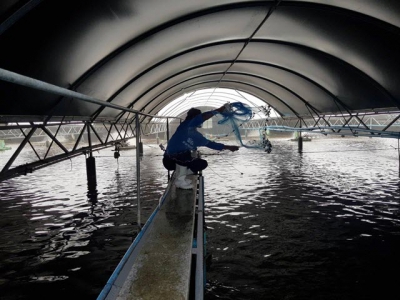A seismic shift in shrimp farming

Charoen Pokphands Foods (CPF) has announced plans to stop farming shrimp in outdoor facilities within the next five years.
The indoor RAS allows for 'organic' shrimp production
“Currently, 15 – 20 percent of the company’s farms in Thailand are indoor. We expect a complete transformation in probably the next 5 years,” said Premsak Wanuchsoontorn, executive vice-president for aquaculture business at CPF.
Wanuchsoontorn made the announcement today, as part of a statement explaining the company’s investment in a model indoor RAS shrimp farm in Bangsrakao, Chantaburi, which has been established to demonstrate the advantages high biosecurity technologies and eco-friendly practices – not only for ensuring better shrimp health, but also to cater for consumer demand for food safety, security, traceability and sustainable natural resource consumption.
The 960,000m2 farm is equipped with an ultra filtration (UF) system, with a pore size of 0.02 micron, allowing it to effectively filter out even viruses. Moreover, it uses biofloc technology to improve water quality as well as providing an additional feed source for the shrimp.
“Those two techniques will not only ensure zero waste water but also prevent business risk from disease. It will guarantee fresh and safety shrimp production without antibiotics,” Premsak said.

The future of shrimp farming? - CPF's Bangsrakao shrimp farm covers 960,000m2
According to Premsak, the water treatment techniques also increase the production capacity of the operation – which yields up to 8 tonnes of shrimp per rai compared to 3 tonnes per rai in traditional systems.
He added that shrimp farming in the future will be more dependent on automation to save man hours and reduce contamination. The Bangsrakao farm is now equipped with several automatic systems.
“Shrimp farmers are reluctant to invest in the closed-indoor farming due to high investment. Bangsrakao’s farm is working on the technique to lower the cost. We believe that, eventually, all shrimp farms will be indoor farm to mitigate the risk of diseases,” he said.
Related news
 CENIACUA develops WSSV-resistant shrimp in Colombia
CENIACUA develops WSSV-resistant shrimp in Colombia White spot syndrome - white spot virus (WSSV) is the most pathogenic of all the serious diseases in the global shrimp industry.
 A progressive approach to shrimp health management
A progressive approach to shrimp health management How water quality management, low stocking densities and the use of specialised feeds can consign the use of antibiotics in shrimp farming to history.
 Broodstock adds to RAS investments
Broodstock adds to RAS investments Seafood investor Broodstock Capital has acquired 50 perent of water treatment company NP Innovation, a leading supplier of water treatment technologies